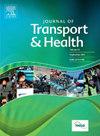A systematic review on the impact of daily commute on the well-being of an urban commuter
IF 3.2
3区 工程技术
Q2 PUBLIC, ENVIRONMENTAL & OCCUPATIONAL HEALTH
引用次数: 0
Abstract
Introduction
The ever-growing demand for regular intra-city trips to meet the economic requirements has also spilled many hostile consequences on the life of an urban resident. The huge surge in the usage of private vehicles for commuting has been acting as an additional factor to degrade the well-being of a city inhabitant. Apart from the emissions, the congested and lengthy trips between home and work were found to have significant toll on health of an individual. Hence, this article tries to augment the understanding towards the impact of daily commute (time and mode) on overall health of an urban commuter, focusing on gender differences.
Observations
Most of the studies agreed that excess duration on road created turbulence in the psyche of a trip maker by usurping the time meant for life beyond job. For an urban commuter, this additional time pressure was observed to be capable of causing suboptimal sleep, hypertension and higher unhealthy fat levels. Across these findings, stakes of female workforce were at greater loss. Under given trip conditions, commuting using active modes was associated with better overall well-being.
Conclusions
To enhance the spatial coverage, a greater number of such inquisitive works are needed in growing economies of the world. Concerted efforts are recommended for better causative analysis of driving to commute and long-term health. Including the impact of driving on orthopaedic strength, by adding gender perspective can add robustness for the body of knowledge and strengthen the rationale for inclusive policy advice.
一项关于日常通勤对城市通勤者幸福感影响的系统综述
为了满足经济需求,人们对定期市内旅行的需求不断增长,这也给城市居民的生活带来了许多不利的后果。大量使用私家车上下班已经成为降低城市居民幸福感的另一个因素。研究发现,除了废气排放,上下班之间拥挤而漫长的交通也会对个人健康造成严重影响。因此,本文试图增加对日常通勤(时间和方式)对城市通勤者整体健康影响的理解,重点关注性别差异。大多数研究一致认为,在路上停留的时间过长会占用工作之外的生活时间,从而给旅行者的心理带来动荡。对于城市通勤者来说,这种额外的时间压力可能导致睡眠不佳、高血压和更高的不健康脂肪水平。在这些发现中,女性劳动力的利益损失更大。在给定的出行条件下,使用主动模式的通勤与更好的整体幸福感相关。为了提高空间覆盖率,世界上发展中的经济体需要更多的此类探究性工作。建议大家齐心协力,更好地分析驾车上下班和长期健康的原因。通过增加性别视角,将驾车对骨科力量的影响纳入研究,可以增强知识体系的稳健性,并加强包容性政策建议的依据。
本文章由计算机程序翻译,如有差异,请以英文原文为准。
求助全文
约1分钟内获得全文
求助全文

 求助内容:
求助内容: 应助结果提醒方式:
应助结果提醒方式:


